Pasteur and the beer of national revenge
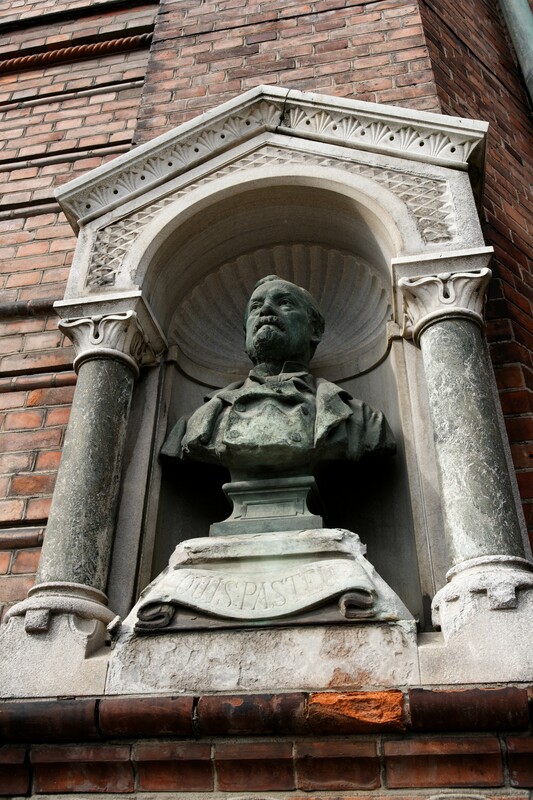
Louis Pasteur, bust at Carlsberg brewery, Copenhagen |
Pasteur was already a scientific icon when he decided to work on brewer's yeast. He had done revolutionary work on wine-making, dairy production, silk worms, and important theoretical work in chemistry and biology. His reason for taking up work on beer was rather surprising: he wanted national revenge over Germany. Germany attacked France in July 1870, causing his only son to enlist and interrupting construction of Pasteur's laboratory.
German lager beers were also taking over the French market, to Pasteur's intense irritation. Pasteur decided to do groundbreaking work on beer fermentation, to give French brewers an advantage they could use to out-compete German brewers, which should mean a heavy blow to the German economy. And groundbreaking work he certainly did.
Before Pasteur started his work there was no agreement on whether fermentation was a purely chemical reaction or whether it was done by living organisms. Nearly a century before, Lavoisier had demonstrated that fermentation caused sugar to turn into alcohol and CO2, but it was still not clear how this happened. Whether living organisms fermented the sugar or not was a point of intense debate. The French Academy of Sciences even set up a prize of 2500 francs to whoever could settle the question.
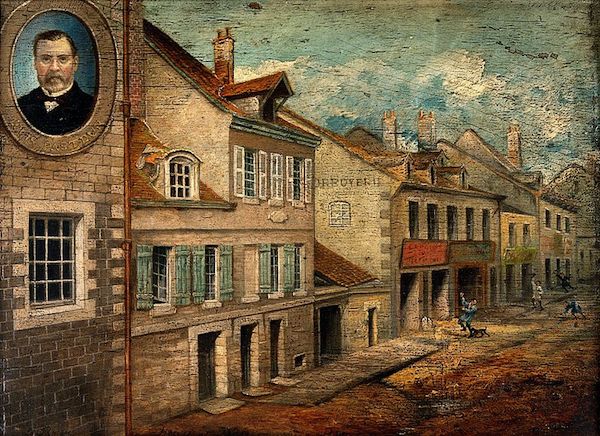
The birthplace of Louis Pasteur. Unknown painter. From Wikimedia Commons. |
In his book Pasteur gives one quote from a chemist, Edmond Frémy, insisting that fermentation was a purely chemical process. The chemist gives a long and confused explanation of "semi-organized bodies" and their "vital energy," which he believes is responsible for fermentation, then goes on:
It will be seen that these opinions are quite different from those which M. Pasteur has maintained in his works, since they attribute the origin of alcoholic and lactic ferments to an albuminous substance. Taking the case of alcoholic fermentation alone, I assert that, in the production of wine, it is the juice of the grape itself which, in contact with air, produces grains of yeast, by the transformation of the albuminous substances.
It sounds incredible today that people could ever have believed such a thing, but clearly they did. Brewing manuals from this time seem to either not discuss what fermentation was (like Olufsen 1812) or to ascribe it to chemical processes (like Molbech 1796). Molbech says a suitable heat and the addition of yeast starts
an inner movement, whereby the salt-like, oil-like, and earth-like matters react among themselves in a subtle inner movement by whose upward and downward flows they are dissolved and thereafter more solidly bound to one another.
This is really just a pile of fancy words to make it clear that Molbech has no idea what's actually going on, but note that there is no mention anywhere of the yeast actually being alive. The same goes for other brewing texts I've seen.
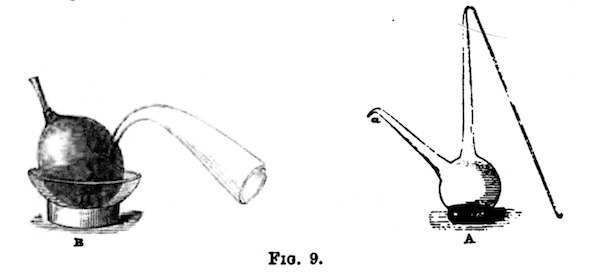
Right, swan-neck bottle. Left, how the swan neck was used to extract juice from the center of a grape. From "Studies in beer", p55. |
Pasteur demolished these ideas in a series of carefully conducted experiments. He took filtered grape must, boiled it for a few seconds, and then filled 40 bottles with it. The bottles had very long and very thin curving necks open to the air. Air could enter, but the dust particles in it, carrying living organisms, would settle in the neck and never make it into the bottle itself. The purpose was to prove that it was the living organisms on the dust, and not the air itself, which caused fermentation.
The 40 bottles were then divided as follows:
- 10 were set aside as controls.
- 10 had drops of water used to wash the skin of grapes added.
- 10 had drops from the same source added, but they were boiled first.
- 10 had drops of juice drawn from the center of a grape added.
Only the second group of bottles fermented, showing visible yeast in the microscope. None of the others fermented, which meant that Frémy's theory could not possibly be right, since all the conditions Frémy said were necessary for fermentation were satisfied. Clearly, it was because his hygiene wasn't good enough that Frémy thought he saw spontaneous fermentation.
It was now clear that something in the air, and on the skin of grapes, was responsible for fermentation. Pasteur had also showed that heat rendered whatever it was inert, but he had not explained what that something was.
Pasteur then went through a series of experiments showing that what organisms were found in the air differed from place to place. In his laboratory there were all kinds of bugs in the air, unsurprisingly, while in the staircase there were fewer bugs. Outside he found a completely different microflora, and he showed that in the vineyard there was most yeast in the air in late summer, when the grapes were ripening.
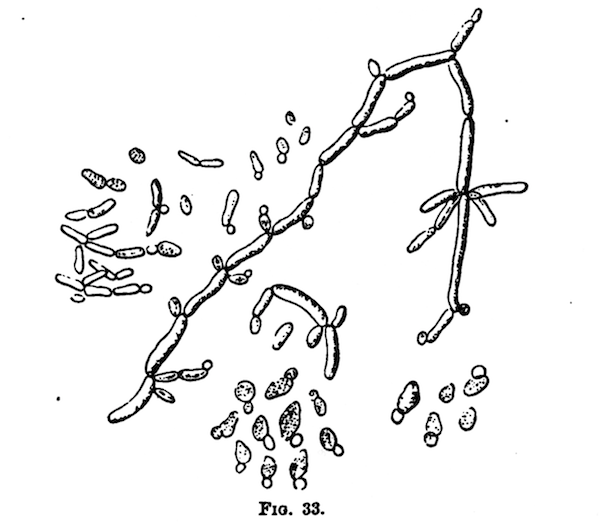
Drawings of "the ferments," as Pasteur called them. From "Studies in beer", p173. |
Pasteur included drawings of the various organisms he saw in his microscope. He classified them into several kinds, and showed that only some of the kinds could ferment sugar, while others would grow without producing CO2 and alcohol. From the drawings and the detailed observations Pasteur made there could be no doubt whatsoever that these were living creatures, and that they were responsible for fermentation. And Pasteur did indeed win the 2500 franc prize from the Academy of Sciences.
Later in his book, Pasteur shows, again via careful experiment and observation, that there are different types of organisms in beer, and that beer goes bad when the wrong kinds get into it. He then presented a number of methods for purifying yeast to remove the "agents of disease," as he put it. Unfortunately, these methods were all rather cumbersome, and not guaranteed to work. As far as I know they never really caught on.
The last chapter in the book is devoted to Pasteur's "new process for the manufacture of beer." That sounds promising, but in reality it's mostly about introducing lab equipment in the brewery, and about the amount of oxygen dissolved in the wort. Pasteur shows how to control and measure the amount of oxygen in the wort, and explains why this is important.
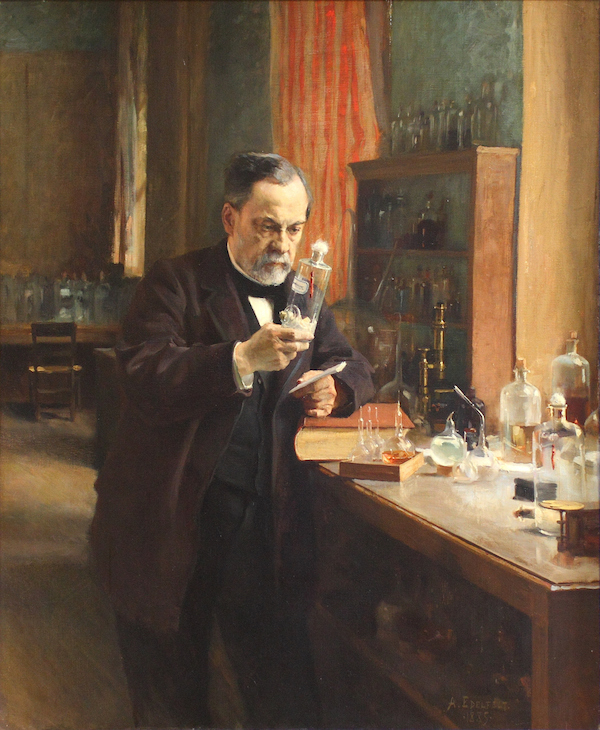
Pasteur in his laboratory, painting by Albert Edelfelt, 1885. From Wikimedia Commons. |
This was important and groundbreaking work, but did it revolutionize brewing? Actually, no. Pasteur's work was of tremendous theoretical importance, but had limited practical use. It showed the importance of hygiene, of course, but brewers were already aware of that. Using acid to clean the yeast of bacteria was useful, but often when the yeast turned bad the problem was not bacteria, and Pasteur had no solution to this problem.
The main thing Pasteur did for breweries was to show them how they could use the tools and methods of microbiologists to get better control over and understanding of their own brewing. In the years after the publication of "Studies on beer," a number of breweries invested in laboratories with microscopes, swan-neck bottles, and all the other equipment Pasteur used.
So Pasteur's practical impact was limited, but within a few years a commercial brewery was to take up his methods and use them to revolutionize brewing to the point that it would never be the same again.
Sources
That Pasteur's research on beer was motivated by a desire for revenge over Germany is beyond doubt. This is the first paragraph of Pasteur's preface to "Studies on beer":
Our misfortunes inspired me with the idea of these researches. I undertook them immediately after the war of 1870, and have since continued them without interruption, with the determination of perfecting them, and thereby benefiting a branch of industry wherein we are undoubtedly surpassed by Germany.
The beer of revenge, Alan G Baxter, James Cook University web site, 2000.
Studies on beer, Louis Pasteur, english translation, Macmillan, London, 1879. (French original published 1876.)
Anviisning for land-almuen til at brygge øl, C. Olufsen, Copenhagen, 1812.
Afhandling om Ølbrygningen i sin fulde Udstrækning, Johan Christian Molbech, Gyldendal, Copenhagen, 1796.
Similar posts
Emil Chr. Hansen and the yeast revolution
In the late summer of 1883, disaster struck at the Carlsberg brewery in Copenhagen
Read | 2017-09-10 14:05
Was all beer sour before Pasteur?
It's often said that before Pasteur's work on yeast (and Emil Christian Hansen's introduction of the pure-yeast system) all beer was sour
Read | 2014-10-26 18:01
The Saccharomyces family
The series on yeast taxonomy now ends with a post on the various species in the Saccharomyces family
Read | 2015-10-17 12:19
Comments
Francesco - 2017-09-04 11:22:34
Hi Lars, wonderful article!
One sentence is confusing to me, though: you said that Pasteur chose to investigate yeast to get back at Germany which invaded France in 1870. But as far as I know, correct me if I am wrong, yeast discovery by Pasteur is dated 1857, 13 years before 1870.
http://www.exploreyeast.com/article/history-yeast
Am I missing out on something?
Lars Marius Garshol - 2017-09-04 11:43:10
@Francesco: Very good question, and perhaps something I should have been clearer on. I'll try to explain here.
Pasteur did not discover yeast. Yeast, as a kind of gooey sludge that needed to be added as part of the brewing process, had been known for a very long time already. (I suspect that's Frémy's "albuminous substance", which today we'd call "protein".) Nor was Pasteur the first to claim that yeast was alive.
But it's true that Pasteur did the groundwork on whether yeast was alive or not long before 1870. In fact, Pasteur got the Ahumert prize in 1863. In his book on beer brewing Pasteur presents both general work on yeast (which he did long before 1870) together with the work that was done specifically on beer brewing. I guess because he feels it makes most sense for the reader that way.
In the blog post I kind of glossed over the timeline because I didn't want to make the presentation too complicated by mixing in too much of the when and why. I felt the what, and its impact on beer brewing, was the main thing. So the blog post mostly follows Pasteur's own presentation in "Studies on beer."
I hope this clears things up!
Jeff Alworth - 2017-09-04 17:19:49
I saw many references to albumins and albuminous substances in 19th C texts and never knew what the hell they were talking about. Thanks--this is enormously helpful.
I do think you understate Pasteur's influence. He was a big fan of lagers, recognizing the value of low temps in retarding contamination, and he encouraged brewers to make beer that way. Pilsners helped the worldwide transformation, but so did Pasteur. By the early 20th century, larger breweries had completely changed the way they brewed to take advantage of his insights, and wild yeasts were on the outs.
Lars Marius Garshol - 2017-09-04 17:34:28
@Jeff: In his book he does mention that low fermentation temperatures help to prevent infections, but it's not exactly something he emphasizes. I suspect brewers were already aware of it themselves. And I kind of wonder that he can have done so much to promote lager brewing in 1876, since by then the lager brewing wave had already spread to most of Europe. Seville in Spain had a lager brewery in 1862. Oslo had lager breweries already in the 1840s. The west coast of Norway by the 1860s, and that's about as peripheral as you can get.
But maybe you've read sources which I haven't. If so, I'd love to hear about them so I can go read them.
By the early 20th century brewers had definitely changed how they brewed, but ... wait for the next blog post. :)
Francesco - 2017-09-05 08:44:33
Thanks Lars, that surely cleared things up.
Noel Sufrin - 2021-03-11 14:25:32
Another great article Lars!
It's funny how many times I stumble across your work as I learn more and more about brewing.
I had followed a link about Edmond Fremy because I just read Louis Pasteur's Studies on Fermentation. I, like you, really enjoy the anthropology and history of brewing as much as the brewing itself! Great information here, as always.
I first learned of you when you gave a TED talk on Kveik on Lallemand's YouTube channel. It's ALL fascinating stuff, and you are an invaluable asset to the brewing community!
Cheers! -Noel aka Stimpygato